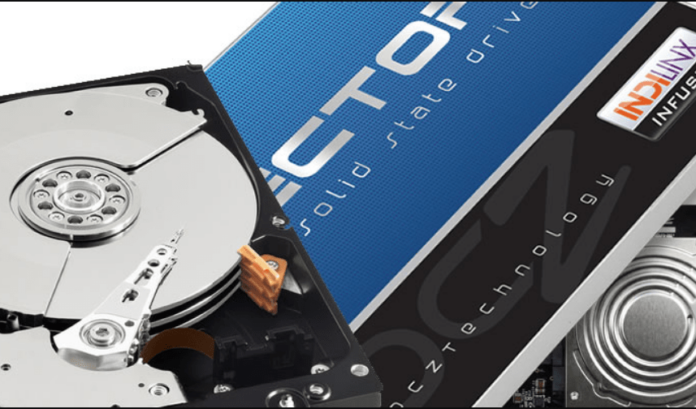I am currently in the process of building myself a new computer and I am writing this article to help others weigh up the differences between solid-state, hard-disk (HDD) and hybrid hard drives. Last time I built a computer I would simply choose the drive that had the largest capacity that my budget could afford. Solid-state drives have made huge advances in recent years and have started to become affordable for the average consumer. So which should I choose?
Hard-Disk Drives
This is the traditional type of computer storage and has been around for decades with little changes to the underlying technology. Because of there age, they are a mature technology and considered by many as the default storage medium. They have rotating magnetic disks and read/write heads that move across the disk to access the data. These drives are called mechanical because of this movement and can break down from time to time.
They come with different speeds; these speeds are measured in revolutions per minute (rpm). These range from 5400rpm to 10000rpm, the standard being 7200rpm. I have only ever seen faster HDDs used in servers.
Modern HDDs have a capacity of up to 4TB and are the most economical storage drive, typically costing only a few cents per gigabyte.
To summarise HDDs are best used for storing lots of data when you are not worried about performance. As a result, HDDs are the standard inside any home computer and used by the average consumer.
Solid-State Drives
Solid-state drives perform the same role as HDDs, being non-volatile storage. Instead of using any mechanical parts they use NAND flash memory. This lack of mechanical parts results in much better performance and are the fastest storage option available. They are also much more durable than HDDs.
Solid state drives normally connect using the SATA interface but a few can use PCI for very high performance applications. Data access is typically a fraction of a millisecond and data transfer can be in excess of 500MB per second.
I have been using solid-state drives in servers for years. The fast data access speeds means that the operating boots within a few seconds.
This extra performance doesn’t come cheap. The capacity of SSDs range from 32GB to 500GB and typically cost $1.00 per gigabyte. That translates for 1TB to $1000! Obviously outside the budget of the average consumer. It is therefore normal to buy a SSD with a small capacity and only store the operating system and application files on the SSD and use a HDD in conjunction to store all your documents, photos and movies.
[alert message=”When solid-state drive dies they don’t tend to give any prior warning”]
From what I’ve seen solid-state drives are best used by advanced users who seek high performance.
Hybrid
A hybrid hard drive is a mixture of a traditional HDD drive and a small solid-state/flash drive in a single package. The drive monitors the usage of data being read and keeps a copy of the most frequently accessed data on the flash memory as a cache. This results in SSD like performance at a fraction of the cost. They cost slightly more than traditional hard drives but nowhere near as much as solid state drives. They make the ideal cost effective solution.
What will I choose?
At a quick glance a hybrid drive would seem to be the best of both worlds. At the present time I don’t need any additional capacity and so a hybrid drive would leave a lot of wasted capacity. Instead, I will buy a small solid-state drive and use this in conjunction with my old traditional HDDs.
What type of storage drive would you choose?








